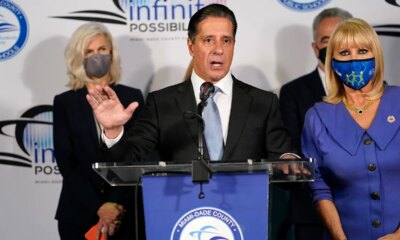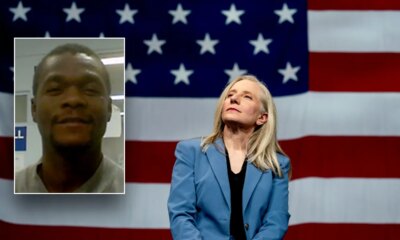Education
Trump Pulled $400 million From Columbia. Other Schools Could Be Next.

The Trump Administration’s abrupt withdrawal of $400 million in federal funding from Columbia University cast a pall over at least nine other campuses worried they could be next.
The schools, a mix that includes both public universities and Ivy League institutions, have been placed on an official administration list of schools the Department of Justice said may have failed to protect Jewish students and faculty.
Faculty leaders at many of the schools have pushed back strongly against claims that their campuses are hotbeds of antisemitism, noting that while some Jewish students complained that they felt unsafe, the vast majority of protesters were peaceful and many of the protest participants were themselves Jewish.
The Trump administration has made targeting higher education a priority. This week, the president threatened in a social media post to punish any school that permits “illegal” protests. On Jan. 30, his 10th day in office, he signed an executive order on combating antisemitism, focusing on what he called anti-Jewish racism at “leftists” universities. Then, on Feb. 3, he announced the creation of a multiagency task force to carry out the mandate.
The task force appeared to move into action quickly after a pro-Palestinian sit-in and protest at Barnard College, a partner school to Columbia, led to arrests on Feb. 26. Two days later, the administration released its list of 10 schools under scrutiny, including Columbia, the site of large pro-Palestinian encampments last year.
It said it would be paying the schools a visit, part of a review process to consider “whether remedial action is warranted.” Then on Friday, it announced it would be canceling millions in grants and contracts with Columbia.
Harvard University, whose former president Claudine Gay resigned last year following a bruising appearance before a House committee, is also on the list.
So are George Washington University; Johns Hopkins University; New York University; Northwestern University; the University of California, Los Angeles; the University of California, Berkeley; the University of Minnesota; and the University of Southern California.
The Trump administration’s moves to hobble university funding and target schools over claims that they tolerated antisemitism had already caused internal recalibration at schools across the country. Some have stepped up lobbying efforts, including hiring lobbyists with connections to Mr. Trump.
Many campuses had already cracked down on students over protest activity. More are dialing back or renaming efforts related to diversity, an effort to avoid the ire of Trump officials who have vowed to end such programs
And a number have paused hiring and reduced the number of doctoral students admitted in response to the financial uncertainty.
Some school officials have said they face an “existential threat.” Still, many presidents have been silent or muted in their public statements about Mr. Trump’s moves against the sector, appearing to retreat in fear of the new administration.
In a statement Saturday, Harvard said it was “committed to ensuring our Jewish community is embraced, respected, and can thrive at Harvard, and to our efforts to confront antisemitism and all forms of hate.”
Several days after Mr. Trump’s inauguration, the president, Dr. Alan M. Garber, posted a message to the university cowritten with other administration leaders.
“In these challenging times,” they wrote, “our efforts will be guided by our values and commitments: supporting academic excellence and the pursuit of knowledge; championing open inquiry, constructive dialogue, and academic freedom.”
The selection criteria for being on the list for visits is nebulous, but a number of the schools had been included in a report last October by the House Committee on Education and the Work Force, which claimed they had allowed antisemitic behavior by students and faculty.
The report criticized Harvard leaders, citing their initial failure to condemn the Hamas attack on Israel in October 2023.
Northwestern and its president, Michael Schill, also had been under attack by the House committee, then led by Representative Virginia Foxx, a Republican from North Carolina. The committee report criticized the university for placing “radical anti-Israel faculty” in charge of negotiations with protesters.
The University of California, Berkeley, was identified in the House report for not disciplining students who took part in an encampment or disrupted a talk by an Israeli speaker.
Berkeley issued a statement on Saturday saying, “We are confident we have the right processes in place now to respond to any antisemitic incidents.” The statement cited an advisory committee the chancellor formed on Jewish student life and campus antisemitism.
While several of the schools have been focal points for campus protests, others are more of a surprise.
Richard Painter, a professor of law at Minnesota, was among those who filed a complaint about antisemitism at the university. He had chafed at incidents on campus, including anti-Israeli statements posted by faculty on official department websites.
Even so, Mr. Painter, a former White House ethics lawyer during the George W. Bush administration, wondered if the school was targeted partly because it sits in the congressional district of Representative Ilhan Omar, a vocal critic of both Israel and Mr. Trump, and in the home state of Gov. Tim Walz, who ran on the ticket with former Vice President Kamala Harris.
“Part of it is political,” he said in an interview Saturday.
Officials at the University of Minnesota could not be reached for comment, but efforts are already underway to address the complaints. The Board of Regents is expected to vote next Friday on a resolution prohibiting individual departments from making political statements on issues of the day.
There was evidence suggesting that the administration’s action against Columbia was accelerated by last month’s sit-in at Barnard, which led to additional protests last week. The protests were sparked by Barnard’s decision to expel two students who interrupted a class on Israel.
On March 3, six days after the initial Barnard disturbance, the government sent a notice to Columbia that it would review $51 million in federal contracts, citing harassment of Jewish students.
The next day, Mr. Trump released a statement on Truth Social saying, in part: “All Federal Funding will STOP for any College, School, or University that allows illegal protests.”
In a news release Friday announcing the cancellation of $400 million in grants and contracts, the task force also accused Columbia of failing to respond to the earlier notice while antisemitic harassment continued on or near campus.
On Friday, Columbia said it was reviewing the administration’s announcement and that it pledged to work with the government.
Also on Friday, Linda McMahon, the newly installed secretary of education, met with Columbia’s interim president, Dr. Katrina Armstrong. Ms. McMahon issued a statement saying that schools “must comply with all federal anti-discrimination laws” to receive federal funding.
The task force’s list was released in late February amid a flurry of executive orders from the White House.
Members of the task force include Leo Terrell, a senior Justice Department lawyer. Efforts to reach Mr. Terrell were not successful on Saturday. It was also unclear if any of the campus visits had been scheduled.

Education
After F.B.I. Raid, Los Angeles School Board Discusses Superintendent
Board members are having an emergency meeting a day after agents raided the home and office of Alberto Carvalho, the Los Angeles Unified School District superintendent. The F.B.I. also searched the Florida home of a consultant with ties to the schools chief.
Education
How A.I.-Generated Videos Are Distorting Your Child’s YouTube Feed
Experts caution that low-quality, A.I.-generated videos on YouTube geared toward children often feature conflicting information, lack plot structure and can be cognitively overwhelming — all of which could affect young children’s development.
Education
Video: Blizzard Slams Northeast with Heavy Snow, Disrupting Travel

new video loaded: Blizzard Slams Northeast with Heavy Snow, Disrupting Travel
transcript
transcript
Blizzard Slams Northeast with Heavy Snow, Disrupting Travel
Several cities across the Northeast received at least two feet of snow, bringing many places to a standstill.
-
“I hope our students enjoy their snow day today and stay warm and safe throughout, but I do have some tough news to share. School will be in-person tomorrow. You can still pelt me with snowballs when you see me.” “It’s probably about the worst I’ve seen. I mean, I was here with the last big storm. I think that was where in 2016 or something. But it wasn’t as bad as this. And the problem is, when the plows come past, they just throw up all the snow. And there’s going to be a big bank here later. So I’m digging it out now to get rid of some of this.” “I do ski patrol on the Lower East Side. I like to check the parks, and sometimes I find people fall in the snow and they can’t get up, like a elderly gentleman went out in his pajamas to get a quart of milk. So, things like that.” “And if you can cook at home, please do so instead of ordering food to be delivered given the conditions. Make an enormous pot of soup and bring some to your neighbors upstairs.”

By Meg Felling
February 23, 2026
-

 World2 days ago
World2 days agoExclusive: DeepSeek withholds latest AI model from US chipmakers including Nvidia, sources say
-

 Massachusetts3 days ago
Massachusetts3 days agoMother and daughter injured in Taunton house explosion
-

 Montana1 week ago
Montana1 week ago2026 MHSA Montana Wrestling State Championship Brackets And Results – FloWrestling
-

 Louisiana5 days ago
Louisiana5 days agoWildfire near Gum Swamp Road in Livingston Parish now under control; more than 200 acres burned
-

 Denver, CO3 days ago
Denver, CO3 days ago10 acres charred, 5 injured in Thornton grass fire, evacuation orders lifted
-

 Technology1 week ago
Technology1 week agoYouTube TV billing scam emails are hitting inboxes
-

 Technology1 week ago
Technology1 week agoStellantis is in a crisis of its own making
-

 Politics1 week ago
Politics1 week agoOpenAI didn’t contact police despite employees flagging mass shooter’s concerning chatbot interactions: REPORT




















